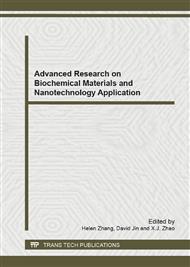p.166
p.170
p.174
p.178
p.182
p.186
p.191
p.195
p.199
Preparation of Hydrophobic Magnesium Hydroxide Nanoparticles by Oleic Acid and Polystyrene-Grafting Surface Modification
Abstract:
In order to avoid their agglomeration and incompatibility with polymer matrix, hydrophobic magnesium hydroxide nanoparticles were obtained by means of grafting polystyrene (PS) onto the surface of nanoparticles after oleic acid (OA) modification. Firstly, the functional double bonds were conducted on the surface of blank magnesium hydroxide nanoparticles by OA modification, and then, PS was grafted on the surface of OA-modified magnesium hydroxide. The microstructure of resultant sample was characterized by TEM, TGA and FTIR. In the meantime, the compatibility with some organic solutions was determined by dispersibility evaluation. The results show that the organic macromolecule PS could be successfully grafted on the surface of OA-modified magnesium hydroxide nanoparticles, and the dispersibility and the compatibility of nanoparticles greatly improved in organic phase.
Info:
Periodical:
Pages:
191-194
DOI:
Citation:
Online since:
January 2013
Authors:
Keywords:
Price:
Сopyright:
© 2013 Trans Tech Publications Ltd. All Rights Reserved
Share:
Citation:


